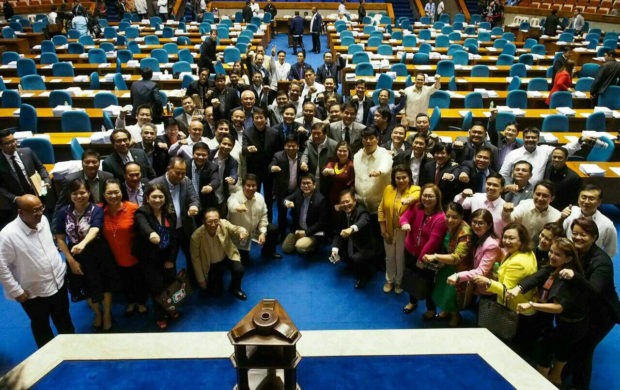
Lawmakers raise President Rodrigo Duterte’s clenched fist salute after defunding the Commission on Human Rights and approving the 2018 budget bill on second reading. (Photo courtesy of the House of Representatives)
The House of Representatives will realign the budgets of the Commission on Human Rights, the National Commission on Indigenous Peoples, and the Energy Regulatory Commission to fund free higher education.
“The budget will form part of the pool of funds to finance the free higher education law,” appropriations committee chair Rep. Karlo Nograles said in a text message.
This was after Speaker Pantaleon Alvarez in a Thursday radio interview vowed to insist on the effective defunding of the agencies when the House and the Senate go on a bicameral conference to reconcile their versions of the 2018 General Appropriations Act.
“I respect the Senate, but it doesn’t mean it will get its way with whatever it wants,” he said. “We can’t always yield to whatever they want.”
The Department of Budget and Management originally proposed budgets of P350.95 million for the ERC, P1.13 billion for the NCIP, and P649.48 million for the CHR, of a total of P2.13 billion.
Akbayan Rep. Tomasito Villarin of the opposition Magnificent Seven bloc criticized the attempt to “soften the criticism” of the House’s 119-32 vote to defund CHR.
“Nice try Karlo, but it ain’t cute. You can’t cut the budget of a constitutional body then to soften criticism [and] bestow it to a supposed loftier cause like free tuition,” Villarin said. “Educating people on the value of human rights should start with our legislators.”
Gabriela Women’s Party Reps. Emmi de Jesus and Arlene Brosas said in a statement that “ensuring funds for the youth’s right to education should not be at the expense of the institution that is mandated to uphold and promote the most basic of human rights, including the right to life.”
Instead, they proposed the House source the funds from the P2.5 billion intelligence funds of the Office of the President, P900 million for the antidrug campaign called Oplan Double Barrel Reloaded, P500 million for the community-based intelligence network Masa Masid, and P56 billion for right-of-way acquisitions.
It may be recalled that House members approved the motions to grant a P1,000 budget to the ERC on Sept. 5, and the NCIP and the CHR on Sept. 12.
The said motions were raised by Zamboanga City 1st Dist. Rep. Celso Lobregat, Bayan Muna Party-list Rep. Carlos Isagani Zarate, and 1-SAGIP Party-list Rep. Rodante Marcoleta, respectively.
Lobregat cited the corruption allegations that hounded the ERC, while Zarate criticized the NCIP for inaction or even complicity in the violation of indigenous peoples’ rights. Both motions were carried without objection.
Marcoleta, meanwhile, claimed the CHR was invalidly created because it took effect under an executive order by President Corazon Aquino at a time when Congress has yet to convene.
He also criticized the agency for not acting on common crimes and for not defending the “human rights” of President Duterte against a critical editorial by the New York Times. The motion was adopted through a 119-32 vote.
Besides the budgets of the defunded agencies, Nograles said in August that P16 billion in scholarship funds could be realigned to fund Republic Act 10931, or the Universal Access to Quality Tertiary Education Act, that President Duterte signed earlier that month.
Such funds are currently allocated under the Commission on Higher Education, the Technical Education and Skills Development Authority, the Department of Health, the Department of Agriculture, the Department of Science and Technology, the Department of Environment and Natural Resources, and various state universities and colleges.
Nograles also said he was looking at P37.5 billion in allocations from the Departments of Transportation, Agrarian Reform and Information and Communications Technology under the 2016 budgets.
The said funds were left untouched and were set to expire when the two-year validity period of appropriations ends on December 31. If they continue to be unspent, the funds would revert to the national treasury and could be tapped to fund a supplemental budget for the free higher education law.
Students from 114 SUCs, 16 local universities and colleges (LUCs) accredited by the Commission on Higher Education and 122 technical-vocational institutions (TVIs) under Technical Education and Skills Development Authority are set to benefit from the law.
SUCs were first allowed to forego the collection of tuition for the academic year 2017-18 under the 2017 General Appropriations Act, even before RA 10931, or the Universal Access to Quality Tertiary Education Act, was signed into law.
The Duterte administration did not originally plan to make tuition free for the 2017 budget, but the Senate realigned P8.3 billion for student financial assistance, allowing SUCs to charge zero tuition. The fund was originally supposed to be allocated to the Department of Public Works and Highways for development projects in the Autonomous Region in Muslim Mindanao. /je
[“Source-inquirer”]
